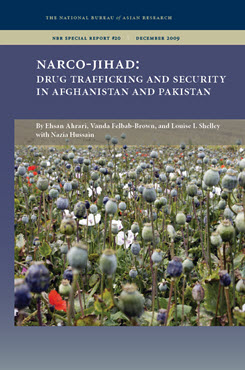Narco-trafficking in Pakistan-Afghanistan Border Areas and Implications for Security
This paper explores the global dynamics of the drug trade in the Afghanistan-Pakistan border area and analyzes the interface of regional actors with key players and networks outside the region.
EXECUTIVE SUMMARY
This paper explores the global dynamics of the drug trade in the Afghanistan-Pakistan border area and analyzes the interface of regional actors with key players and networks outside the region.
MAIN FINDINGS
- Afghanistan produces 90% of the world’s opium supply, a third of which is transited through Pakistan. Opium is not the only illicit trade in the Pakistan and Afghanistan border regions, however. Afghanistan is now the second-largest cannabis resin producer in the world. There is also significant illicit trade in timber, antiquities, and cigarettes in the border areas.
- In addition to southern routes through Pakistan, drug traffickers rely on western routes via Iran and northern routes through the Central Asian states. As Russia became deeply integrated into the global drug market due to inadequate border controls and large-scale migration among the Soviet successor states, routes through Central Asian states have become extremely important in the global drug trade.
- The drug trade across the Afghanistan-Pakistan border is not only weakening state control but also cementing linkages among drug traffickers throughout the larger region, Taliban, insurgents, and criminal groups. In turn, this nexus of drugs, crime, and insurgents threatens NATO supply routes and offers resistance to ongoing military operations in Afghanistan and Pakistan’s tribal areas. This nexus also poses a significant challenge because the networks of the drug trade that support the conflict are not contained within the Afghanistan-Pakistan region.
POLICY IMPLICATIONS
- A culture dependent on illicit trade develops along with the societal norms supportive of this criminal activity. This suggests the need for incentives other than legitimate employment to encourage growers and marketers away from the drug business.
- Analysts and policymakers should not ignore drug-related activities of the warlords. Drugs and crime are not a peripheral problem to the establishment and maintenance of order. Now that the drug problem has grown significantly, in the future warlords involved with drug trafficking, once they no longer receive support from U.S. and NATO troops, will be less likely to cooperate in fighting terrorists. The warlords’ accommodation is temporary and one of convenience.


